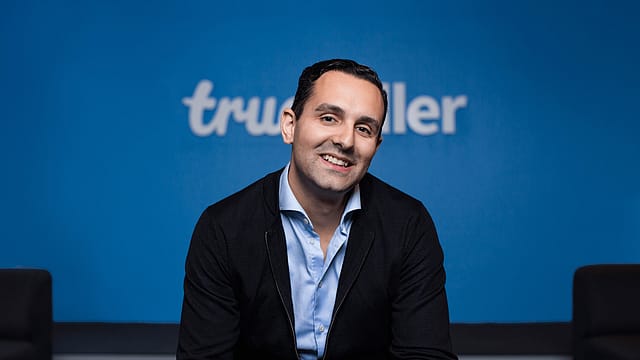We comply with Indian laws; localise data: Truecaller CEO Alan Mamedi
ADVERTISEMENT

Swedish firm Truecaller is very much in compliance with Indian regulations, CEO & co-founder Alan Mamedi said at a select media roundtable in New Delhi on Tuesday. Faced with a barrage of questions on India's data protection rules which are yet to be formalised and are still being actively deliberated upon by lawmakers, the CEO said that the company "is positive" to the bill and the rules once implemented will not hinder business. "The biggest challenge for companies will be to localise the data. We started doing it in 2018," says Mamedi. He further defended the company's case, emphasising that the firm does not collect biometric data or sensitive information. Truecaller is very different from a financial institution, the CEO says. "There's an IT act we are already compliant with. We are doing way beyond what the local laws require," says Mamedi.
About 50% of the company's data is collected from its users, the firm claims. "50% of the calls are between Truecaller users," say company officials. Parts of the data are also generated by users. For instance, the firm claims that its users receive as many as two billion unknown calls everyday and in most cases, users flag certain numbers as spam which the company then identifies and categorises as spam. Mamedi says that in an increasingly digitised economy, spam blocking is an "inalienable building block" to enable safe communication for the community in a world where frauds, stalking, and harassment are being continuously perpetrated and initiated online and by telephone calls and messages. "The expectation of an individual to keep their name and phone number private when making phone calls is outweighed by the critical public interest and public safety concern addressed by identifying the calling party," says Mamedi. "We remain committed to complying with local regulations. We empower our users to control their data, how it is being displayed and for anyone to delist data, even in markets where this is not required," adds Mamedi.
Questions have at times been raised around Truecaller's business practices. A recent investigative report published by local media suggested that the firm has leveraged the lack of adequate data protection framework to collect data without users' consent. It said that the company may be compiling a whole financial profile of its registered users. Truecaller denied the claims made in the report. The firm said it does not sell user data. "Truecaller does not have the capability of building financial profiles," it said in a blog.
Truecaller counts India as its biggest market—about 220 million or over 70% of its about 300 million global monthly active users (MAU) are from the country. The opportunities for growth are manifold and only continue to widen. Mamedi is quite bullish on the market. India's smartphone penetration is only deepening and if industry estimates are to be believed, the country could have about 700-800 million active (data) connected smartphone users by the end of 2024 from about 420-430 million users currently. If this growth trajectory indeed persists, "India will be bigger for us," says Mamedi. India's first time smartphone users with data connectivity is a big growth driver for the company, more than the supposed rollout of 5G. "We have to see what 5G has to offer," says Mamedi. Besides, the local economy is growing at a steady pace which in itself is a big tailwind. "We want to focus on the fast growing markets because that's where the excitement is. We want to build a company that lasts forever," says Mamedi. The share of Indian smartphone users using Truecaller has increased from 35% to 50% in the last two to three years, the company claims. "India has always been the most important market for us and it will continue to be," says Mamedi.
The company that runs an app which verifies contacts and blocks unwanted communication employs the biggest share of its workforce, amounting to some 170 people in India. Globally, the firm's employee count is a little over 300. "We have three offices now in India and we will continue to expand," says Rishit Jhunjhunwala, chief product officer and India MD. Quite obviously, India has cornered the bulk of the company's share of global investments, Jhunjhunwala said without elaborating on the specifics. "We do very core product development in India. Many of our products are built here," says Jhunjhunwala. The key focus area for Truecaller going on would be B2C (business-to-consumer) communication. "We want to make sure that if an ICICI is calling you, it is actually them," says Mamedi who believes that the concept of DND doesn't really work and spammers always find their way around. "In India, we show results on 90% of the calls," says Mamedi. Also, messaging innovation will continue to be a priority. Today, if a user decides to use Truecaller as the default messaging application, he/she can avail a host of features such as Smart SMS, automatic spam detection and automatic reminders. Smart SMS basically is a feature that enables a customer to segregate important messages and spam messages depending on the content. Such applications should come in handy for broader masses, many of whom may not be equipped enough to handle the rush of messages and notifications that companies flood the messaging screens with to market their products or schemes. The strategy will be to increasingly reach the tier two and three consumers as these are the regions which will drive the next phase of growth. "We are building a product for the masses," says Mamedi.
A big area of concern for Mamedi, however, is to fight certain misconceptions about Truecaller that persists in India. For instance, many are of the notion that the company has links to China. "We never had a Chinese shareholder. We are more of an Indian company. We have an entity here (in India.) We pay taxes to local authorities," says Mamedi.